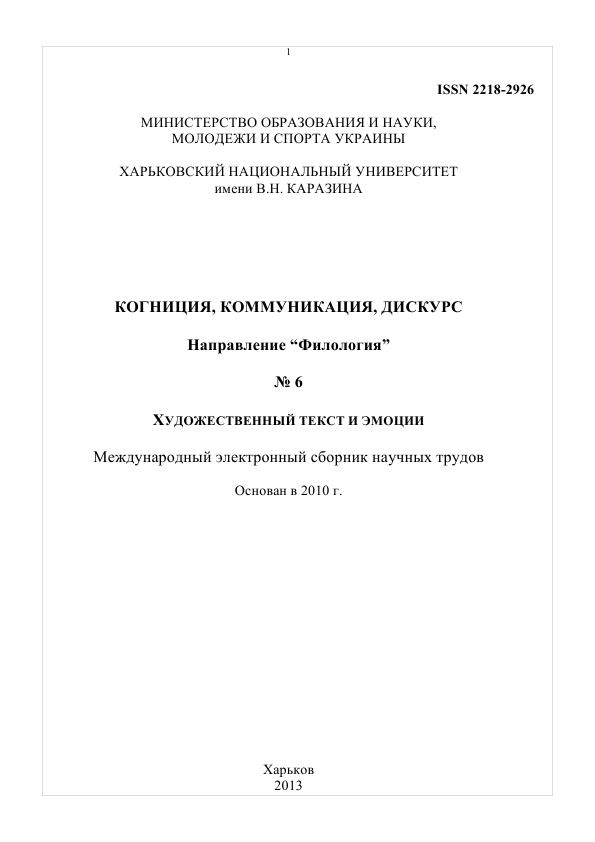Biblical vs. Human Paradoxes, and Ways of Dealing with Post-Paradoxical Confusion
Abstract
This article proposes a comparative study of semantics and pragmatics of human and biblical paradoxes in English discourse. Paradoxes are part of the subconscious code of language. The author uses methods of cognitive linguistics, pragmatics, psycholinguistics, and discourse analysis to prove that manipulative human paradoxes are mentally destructive for the addressee, since they cause post-paradoxical confusion. And conversely, biblical paradoxes are beneficiary for the recipient, which makes them an effective tool in biblical paradoxical therapy.
Downloads
References
Austin J.L. How to Do Things with Words / Austin J.L. – Cambridge: Harvard University Press,1962. – 192 p.
Bateson G. Toward a Theory of Schizophrenia / G. Bateson // Behavioral Science. – 1956. – No 1. – P. 251–264
Chafer L.S. Systematic Theology, Volumes 1, 2. / Chafer L. S. – Dallas: Zondervan, 1948. – 2880 р.
Fauconnier G. The Way We Think: Conceptual Blending and the Mind’s Hidden Complexities / G. Fauconnier, M. Turner. – N.Y.: Basic Books, 2002. – 440 p.
Grothe M. Oxymoronica: Paradoxical Wit and Wisdom from History’s Greatest Wordsmiths / Grothe M. – New York: Harper Collins Publishers, Inc., 2004. –
195 p.
Kolomiytseva O. A. Psycholinguistics: A Teaching Guide / Kolomiytseva O.A.– Kyiv: KSLU, 1999. – 131 p.
Kunz G. The Paradox of Power / Kunz G.– New York: University of New York Press, 1998. – 210 p.
Misra A. The Zeno’s Paradox in Quantum Theory / A. Misra, E.C. Sudarshan, – Austin, Texas: Center for Particle Theory, University of Texas, 1976. – http://wildcard.ph.utexas.edu/~sudarshan/pub_bak/1977_005.pdf
San Pedro J. The Metaphoric Process in Schizophrenia / J. San Pedro // Metaphor, Communication and Cognition. – Toronto, 1987–1988. – P. 71–77.
SelviniPalazzoli M. Family Games: General Models of Psychotic Processes in the Family / M. Selvini-Palazzoli et al. – New York: W.W. Morton & Company, 1989. – 285 p.
Spivak D.L. Linguistics of Altered States of Consciousness / Spivak D.L. – Bochum: Dr. Brockmeyer University Press, 1992. – 122 p.
Жигадло Е.Ю. Парадоксальные высказывания в англоязычном художественном дискурсе: автореф. дис. на соискание учен. степени канд. филол. наук: 10.02.04 “Германские языки” / Е.Ю. Жигадло. – Киев, 2006. – 21 c.
Authors, who publish with this journal, accept the following conditions:
The authors reserve the copyright of their work and transfer to the journal the right of the first publication of this work under the terms of the Creative Commons Attribution License (CC BY), which allows other persons to freely distribute a published work with mandatory reference to the authors of the original work and the first publication of the work in this journal.
Authors have the right to enter into separate additional agreements for the non-exclusive dissemination of the work in the form in which it was published by this journal (for example, to post the work in the electronic institutions' repository or to publish as part of a monograph), provided that the link to the first publication of the work in this journal is given.
The journal policy allows and encourages the authors to place the manuscripts on the Internet (for example, in the institutions' repositories or on personal websites), both before the presentation of this manuscript to the editorial board and during review procedure, as it contributes to the creation of productive scientific discussion and positively affects the efficiency and dynamics of citing the published work (see The Effect of Open Access).




